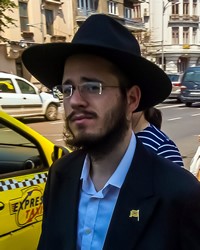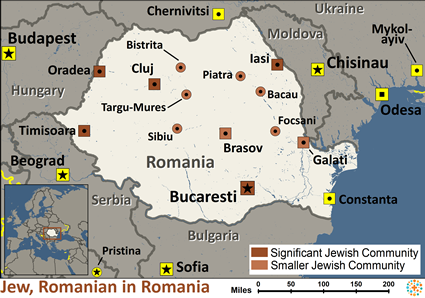Jewish people have lived in Romania since the days of the Roman Empire. They were later joined by Polish and Spanish Jewish people, both of whom arrived during the Renaissance, the latter as refugees from Catholic Spain in 1496. More Jewish people came in the 1800s from the east. Others are from Italy, Greece and the Middle East. As time went on, the Romanian Jewish community became a blend of all of these Jewish communities.
Until WWI, not all Romanian-born Jewish people were citizens. Between the wars, they were denied jobs and a university education. During WWII, they suffered loss of property and lives even as the Romanian government sought to protect them from deportation. Since the war, there has been an outmigration. Today, some remain in the cities of Bucharest, Iasi, Cluj and Oradea.
The Jewish emigration from Romania is cause for concern among the remaining aged Jewish population. As the older Jews die, the Jewish community dwindles. Many of the younger Jews have not embrace their Jewish identity. They are either non-observant or have assimilated into the Romanian culture. There is a Federation of Jewish Communities that publishes a newspaper. In Bucharest, the capital, there is a Yiddish theater and a Chabad House. Indeed, Romania was where Yiddish theater began.
For religious Jews, God is the Supreme Being, the Creator of the universe, and the ultimate judge of human affairs. Beyond this, the religious beliefs of the Jewish communities vary greatly. Orthodox Jews generally follow the traditional religious beliefs and practices found in the Jewish literature that interprets Scripture regarding ethical, religious, civil, and criminal matters.
Reform Jews do not believe that the Jewish Law is revealed by God. They are not restricted to kosher foods. They neither wear the skullcap (yarmulke) when praying nor use Hebrew in prayer. All religious Jews believe in the coming of a Messianic Age, but only the Orthodox Jews look for a personal Messiah.
Many Jewish people retain cultural Judaism, but they have rejected the spiritual elements taught in the Old Testament. They might take part in cultural events and even religious ceremonies, but they are either secular or New Age in their spiritual lives.
Jewish people have a wonderful understanding of their connection with the Abrahamic Covenant. However, they also have a history of rejecting Jesus Christ as Messiah, the one who has fulfilled that covenant. They tend to view Christianity as the religion of their oppressors rather than the fulfillment of what God promised all of humanity through Abraham centuries ago.
Pray for the Lord to give the Jewish people in Romania hearts that will want to please him. May they look to the Lord for guidance and truth, and not be satisfied with cultural traditions.
Pray for Jewish people in Romania to begin a movement to Jesus Christ, finding ways to exalt him while honoring their culture.
Pray for the Lord to move among Jewish leaders in Romania to open the doors to Christ's ambassadors.
Scripture Prayers for the Jewish, Romanian in Romania.
https://www.worldjewishcongress.org/en/about/communities/RO
| Profile Source: Joshua Project |

























